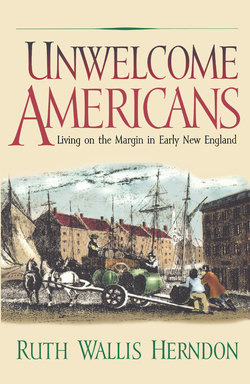Читать книгу Unwelcome Americans - Ruth Wallis Herndon - Страница 13
На сайте Литреса книга снята с продажи.
Оглавление2. Family Life
THE NARRATIVES in this chapter focus on the ways poor transients organized themselves into families, which were sometimes quite ordinary and traditional and other times quite the opposite. Officials frequently were dismayed by “improper” households: men and women lived together without being legally married, women gave birth to children who were legally “bastards,” faithless men abandoned women and children to manage for themselves, women clustered together to raise children as an extended household with no adult males present, former bound servants and slaves lived lives unregulated by “proper” masters. While town leaders often tolerated such households within their community, they could—and did—intervene to remove the offenders if the household caused complaint.
In eighteenth-century New England, the terms “family” and “household” were used nearly interchangeably, referring to all who lived together as a unit based as much on economic survival as on affection and kinship ties. A traditional Anglo-American family was ideally headed by a man and often consisted of more than parents and children or stepchildren; it might include other kin, bound servants and slaves, and hired hands or day laborers. Authorities looked upon these household members as part of a man’s family. One newly arrived resident reported to Providence authorities “that he hath in family himself, his wife, four children and a Negro girl.” Another was fined for “having received into his family” a transient woman without notifying the town council.1
This chapter opens with the narratives of the Pike and Butler families, which were organized along fairly traditional, patriarchal lines, just as half of transient families were. In these cases, it was not household organization but poverty and illness of particular family members that prompted town officials to take action. These stories are included because they illustrate how some families coped with poverty, transience, and the threat of being warned out. By acting as a coherent unit, they demonstrated an important line of defense for those without a legal settlement: relying on those who constituted family.
The rest of the narratives in this chapter focus on families whose unorthodox organization drew official attention and resulted in warning out. Families who did not fit the traditional patriarchal pattern were numerous, making up fully half of the transient households in this study. At the heart of some of these families were a man and a woman whom I have termed “mates”: authorities recognized them as a couple, but since the pair could not produce evidence of a legal marriage, they did not merit the protection of a shared legal settlement. This was the case with the parents of Susannah Guinea (Chapter 1), and it was the case with Judah Hazard Wanton and Lambo Wanton (this chapter). These couples may have considered their relationships binding, but however strong their personal commitment, it carried no official weight and could not prevent forced separation through warning out.
Other households had at their heart a woman who managed a family without the economic and social support of a husband. Sometimes these women claimed to be married, other times not, but all took responsibility for children and grandchildren who lived within their households. Indian women Mary Fowler and Sarah Gardner (this chapter) each bore many children without officials accepting their mates as legal spouses. Wait Godfrey (this chapter) also produced a large number of children with “husbands” who were always absent, but officials took the children from her and placed them as indentured servants so speedily that she never managed an extensive household as Fowler and Gardner did.
Still other transient families centered around mates in relationships that had neither legal protection nor social advantages. Abigail Foster accused Christopher Stocker of bigamy and had a detailed story to back up her claim. Nathaniel Whitaker never stayed long in any relationship, being given to two-timing his wife or current mate. Robert Fuller ran away from his wife and children when they were at a moment of great need. Thomas Field became so abusive toward his ex-wife during their divorce that he was jailed and then forcibly transported by officials.
